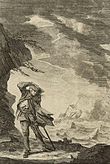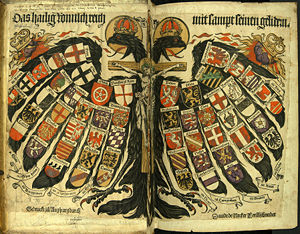- Portal:History
-
- Wikipedia portals:
- Culture
- Geography
- Health
- History
- Mathematics
- Natural sciences
- People
- Philosophy
- Religion
- Society
- Technology
The History Portal
History is the interpretation of past events, societies and civilisations. The term history comes from the Ancient Greek historia (ἱστορία), "an account of one's inquiries," and shares that etymology with the English word story. The 1911 Encyclopædia Britannica stated that "history in the wider sense is all that has happened, not merely all the phenomena of human life, but those of the natural world as well. It is everything that undergoes change; and as modern science has shown that there is nothing absolutely static, therefore, the whole universe, and every part of it, has its history."This month's featured article
Captain Edward Low was a notorious English pirate during the latter days of the Golden Age of Piracy, in the early 18th century. He was born around the 1690's into poverty in Westminster, London, and was a thief from a young age. Low moved to Boston, Massachusetts, as a young man. His wife died in childbirth in late 1719. Two years later, he became a pirate, operating off the coasts of New England and the Azores, and in the Caribbean.
He captained a number of ships, usually maintaining a small fleet of three or four. Low and his pirate crews captured at least a hundred ships during his short career, burning most of them. Although he was active for only three years, Low remains notorious as one of the most vicious pirates of the age, with a reputation for violently torturing his victims before killing them. Sir Arthur Conan Doyle described Low as "savage and desperate," and a man of "amazing and grotesque brutality". The New York Times called him a torturer, whose methods would have "done credit to the ingenuity of the Spanish Inquisition in its darkest days". The circumstances of Low's death, which took place around 1724, have been the subject of much speculation.
(more...)
Featured picture
The Double-headed eagle is a state symbol of the Holy Roman Empire, for whom it represents the separation of church and state. This hand-colored woodcut depicts the eagle among various states that made up the Empire at the time of the woodcut's creation, in 1510. Through its important symbology in Roman heraldry, the eagle came to occupy an important position in European coat of arms, and still does today, most prominently as the Coat of arms of Russia.
Did you know...
...that Horatia N. Thompson (pictured) was christened with Lord Nelson and Mrs Hamilton as godparents and was later adopted by them as an orphan, even though they were her biological parents?
...that the 1609 Treaty of Antwerp was influenced by the writings of Hugo Grotius in the Mare Liberum, which was published at the insistence of the Dutch East India Company during the course of the treaty negotiations?
...that Grand Duke Nicholas Mikhailovich of Russia let a soldier tasked with his execution take care of a cat?
...that, after driving the French Republicans from Italy, Russian Field-Marshal Alexander Suvorov managed to conduct a masterful flight across the snow-capped Alps?
...that George Rogers Clark was called the "Conqueror of the Northwest" because of his victorious Illinois campaign in the American Revolutionary War?
...that the crown-cardinals of Austria, France, and Spain could exercise the jus exclusivae during papal conclaves from the 16th to 20th centuries?
...that some accounts regarding the fighting during the Battle of Bonchurch states that some of the female population of the Isle of Wight participated by firing arrows at the French troops?
...that the Mongol Empire, also known as the Mongolian Empire was the largest contiguous empire in world history and for some time was the most feared in Eurasia?
...that the pioneers traveled to the Salt Lake Valley in the Great Basin using wagons, handcarts, and, in some cases, personally carrying their belongings. Their trail along the Platte River and over the Sweetwater River became known as the Mormon Trail?
...that when Mawewe, the putative king of Gazaland (in 19th-century Mozambique), played rough with the colonial Portuguese by demanding tribute and threatening to exterminate the Europeans if they refused to pay, Paiva de Andrade, then governor of Lourenço Marques, responded by sending a single rifle cartridge to Mawewe, saying that this would be the form his tribute would take?
...that the Muslim conquests (632–732), (Arabic: فتح, Fataḥ, literally opening,) also referred to as the Islamic conquests or Arab conquests, began after the death of the Islamic prophet Muhammad. He established a new unified political policy in the Arabian Peninsula which under the subsequent Rashidun (The Rightly Guided Caliphs) and Umayyad Caliphates saw a century of rapid expansion of Muslim power?
History subportals
WikiProjects

History
Ancient Near East • Arab-Israeli conflict • Australian History • Aztec • Former countries • History of Canada • Chinese History • Geologic Timescale • Heraldry and vexillology • History of India • History of Poland • Jewish history • History of Russia • Medieval Scotland • Mesoamerica • Military history • United Nations • Middle Ages • History of Science • United States Congress • Iran
Time
Days of the Year • Years • Years in science
Biography
Authors • Composers • Political figures • Saints • United States Presidents
Things you can do
Here are some Open Tasks :- Copy/edit: Hongwu Emperor, Indian independence movement, Modern history, More...
- Wikify:
- Merge: More...
- Requests: , More...
- Stubs: Greco-Roman, Java War, Leopold II of Austria, Panhellenic Liberation Movement, Rio Protocol, Social history, Golden Age of Piracy, More...
- Requested pictures - of history topics
- Are you a historian, i.e. one who studies and writes history, and who has a keen interest in writing outstanding articles? Join our fine group by adding [[Category:Wikipedian historians]] to the bottom of your user page.
-
Categories
History • By period • By region • By topic • By ethnic group • Historiography • Archaeology • Books • Documents • Maps • Images • Magazines • Museums • Organizations • Fictional • Pseudohistory • Stubs • Timelines • Chronology • People • Wikipedia historians
Associated Wikimedia

History on Wikiquote
Quotes
History on Commons
Images
History on Wikisource
Texts
History on Wikibooks
Manuals & TextsPurge server cache Categories:- History portals
- History
- Chronology
Wikimedia Foundation. 2010.












